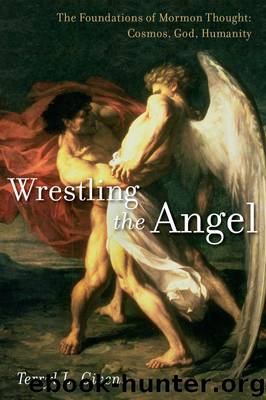Wrestling the Angel: The Foundations of Mormon Thought: Cosmos, God, Humanity by Terryl L. Givens

Author:Terryl L. Givens [Givens, Terryl L.]
Language: eng
Format: epub
Publisher: Oxford University Press
Published: 2014-10-03T06:00:00+00:00
The most recent version of the handbook also notes that sexual relations in marriage “are divinely approved not only for the purpose of procreation, but also as a way of expressing love and strengthening emotional and spiritual bonds between husband and wife.”67
The other preventive to birth—abortion—has had a more consistent condemnation in Mormon thought. Nineteenth-century figures—including feminists like Susan B. Anthony and Cady Stanton, used the terms abortion, foeticide, infanticide, and child-murder as interchangeable or near-equivalents.68 It was likely in this sense that Mormonism’s first oblique reference to abortion comes in 1831. “Thou shalt not … kill, nor do anything like unto it.”69 Young and other early Mormon leaders referred to “abortion, infanticide and child-killing” as related crimes, recognizing little distinction from murder.70 “Infanticide is … not so boldly practiced as is the other equally great crime, which no doubt, to a great extent, prevents the necessity of infanticide,” said Young in reference to abortion.71 George Q. Cannon and John Taylor agreed that the practice was a “black art,” “a damning evil,” and constituted “murder of the unborn,” and was so rampant that America had become “a nation of murderers.”72 The modern LDS Church officially treats most abortions as “like unto,” rather than “the same as,” murder; one may repent and be baptized for the first, but not (without special dispensation) for the latter. Exceptions to the prohibition may be made in cases of dire threat to the mother’s health, rape, or incest.
Though the doctrine of pre-mortality has bearing, as we have seen, on Mormon conceptions of procreation generally, it is not typically invoked as having bearing on abortion. Precisely when the soul enters the body is for Mormons, as for Christians generally, a subject of speculation rather than dogma. For a minority of Mormons, the theological emphasis on choice is persuasive rationale for supporting abortion rights. In response, Apostle Dallin Oaks has pointed out the flaw in such reasoning: the sanctity of one agent’s choice can never trump the sanctity of the other’s life. Given the status of the unborn child as an human individual in Mormon thought, two human agents, and two vested interests, must be weighed accordingly. Oaks’s comments also have the virtue of highlighting a particular Mormon understanding of choice. As we saw earlier, a Mormon view of moral freedom assumes the sacrosanct link between choice and consequence. Freedom, in other words, is grounded in a framework of natural law. As Oaks reasons, “the effect in 95 percent of abortions is not to vindicate choice but to avoid its consequences; using arguments of choice to try to justify altering the consequences of choice is a classic case of omitting what the Savior called the ‘weightier matters of the law.’”73 Ironically, in this vision, those who seek to safeguard the human products of conception are the actual defenders of the principle of choice.74
Download
This site does not store any files on its server. We only index and link to content provided by other sites. Please contact the content providers to delete copyright contents if any and email us, we'll remove relevant links or contents immediately.
Signature in the Cell: DNA and the Evidence for Intelligent Design by Stephen C. Meyer(2515)
Real Sex by Lauren F. Winner(2498)
The Holy Spirit by Billy Graham(2445)
The Secret Power of Speaking God's Word by Joyce Meyer(2268)
The Gnostic Gospels by Pagels Elaine(2048)
Devil, The by Almond Philip C(1913)
Jesus by Paul Johnson(1902)
23:27 by H. L. Roberts(1899)
The Nativity by Geza Vermes(1859)
All Things New by John Eldredge(1792)
Chosen by God by R. C. Sproul(1778)
Angels of God: The Bible, the Church and the Heavenly Hosts by Mike Aquilina(1638)
The Return of the Gods by Erich von Daniken(1583)
Angels by Billy Graham(1560)
Evidence of the Afterlife by Jeffrey Long(1470)
Knowing God by J.I. Packer(1440)
The Gnostic Gospel of St. Thomas by Tau Malachi(1420)
Victorian Sensation by James A. Secord(1413)
How To Be Born Again by Billy Graham(1413)
